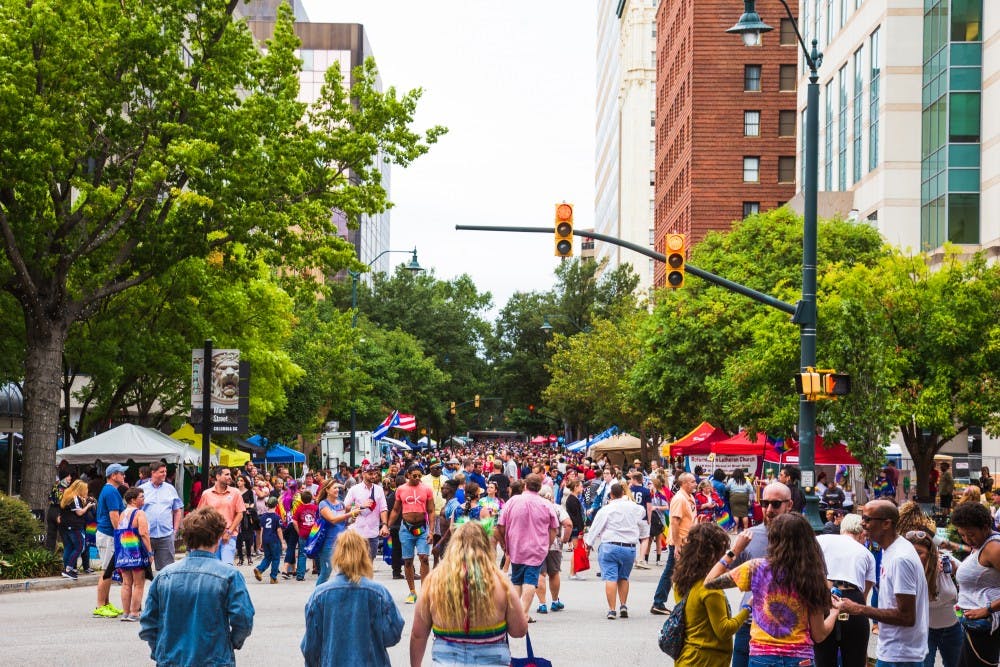“The whole event is about exploring, learning and experiencing the way that other people want to engage with their community,” third-year philosophy major and secretary of Trans Student Alliance (TSA) Club, Asher Wood, explains.
Columbia’s Famously Hot South Carolina Pride kicked off the weekend with a night parade down Main Street on Friday evening to celebrate its 30th pride festival. The organization strives to support the LGBTQ+ community, to celebrate the richness and diversity, to educate the general population and to advocate for equality and inclusion in all areas of life, according to their website.
Not only did many individuals from campus choose to attend the event, but multiple clubs and organizations marched in Friday’s parade. TSA is one of those clubs; they advocate for, educate and empower transgender students on campus and in the community.
“[Trans Student Alliance] is not just for trans students,” Wood says. “If you are not a trans person and want to dispel some of the mystery, which is one thing that we like to do because it helps with acceptance, coming to our meetings and learning what being trans is all about is a very helpful thing. It’s almost like vaccine immunity; the more people who actually understand it and recognize what being trans is, the more people there are to correct other people’s mistakes.”
While an informed understanding of trans culture and complete acceptance are the ultimate goals for TSA, Wood explains that most members would be content with respect.
“Acceptance is hard to distinguish from tolerance, and I think for the most part, people in our club would be happy to just be able to live their lives without interference from others."
Individuals Respecting Identities and Sexualities (IRIS) is another university based club that is a “social, service and advocacy organization for the LGBTQ+ communities at the University of South Carolina,” according to their bio on Garnet Gate.
“We’re here, and we’re far more visible than you probably think that we are,” declares fourth-year history and African American studies student, Natalie Hicks, who is also the president of IRIS. “We are a fun group of people and if you’re not fully out or not out in any capacity, you’re more than welcome to join us. We’re here for anyone and everyone, and you don’t have to be part of the community to come and join us.”

To Hicks, marching in the parade provides an opportunity for her to be completely transparent about who she is.
“Being involved in pride means being able to authentically and proudly share to the world who I am and who my tribe is, and that’s really exciting and powerful to me,” says Hicks.
UofSC’s student athletes are another group that grouped together to march on Friday. Third-year biology major and UofSC Baseball Infielder, Noah Campbell, was looking forward to the pride festival so he could celebrate a diverse amount of people.
“It’s good that everyone is happy and that everyone finds love in their life. Love is important for everyone to have, not just a select few. I think everyone should be able to have that.”
Not only were undergraduate students present at pride, but graduate students came to celebrate as well. First year master’s student, Rachel Young, is studying public history and library and information science, and was skating through pride along with the Columbia Roller Derby.
“Pride is a time when I get to celebrate diversity and get to be myself around other people who also don’t usually get to express themselves the way they want to,” Young expresses.
Students also showed up as a part of campaigns completely unaffiliated from the university. Third-year public relations student, Philicia Thompson, marched in the parade with Senator Elizabeth Warren’s campaign.
“Pride is important for a lot of reasons for UofSC students,” Thompson says. “For one, diversity and inclusion is a message they preach so much that we should be practicing it as well by being here and being present. Two, I think it opens doors for people to be here and have a community to show that support, show that you have a team behind you. Whether your family doesn’t love you, or whatever your case may be, you have a community and a town to call home.”



